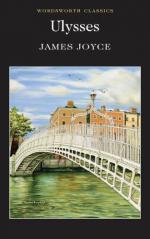—The burden of proof is with you not with me, he said frowning. If you deny that in the fifth scene of hamlet he has branded her with infamy tell me why there is no mention of her during the thirtyfour years between the day she married him and the day she buried him. All those women saw their men down and under: Mary, her goodman John, Ann, her poor dear Willun, when he went and died on her, raging that he was the first to go, Joan, her four brothers, Judith, her husband and all her sons, Susan, her husband too, while Susan’s daughter, Elizabeth, to use granddaddy’s words, wed her second, having killed her first.
O, yes, mention there is. In the years when he was living richly in royal London to pay a debt she had to borrow forty shillings from her father’s shepherd. Explain you then. Explain the swansong too wherein he has commended her to posterity.
He faced their silence.
To whom thus Eglinton:
You
mean the will.
But that has been explained,
I believe, by jurists.
She was entitled to her widow’s
dower
At common law. His legal
knowledge was great
Our judges tell us.
Him
Satan fleers,
Mocker:
And
therefore he left out her name
From the first draft but he
did not leave out
The presents for his granddaughter,
for his daughters,
For his sister, for his old
cronies in Stratford
And in London. And therefore
when he was urged,
As I believe, to name her
He left her his
Secondbest
Bed.
PUNKT.
Leftherhis
Secondbest
Leftherhis
Bestabed
Secabest
Leftabed.
Woa!
AMPLIUS. In SOCIETATE HUMANA hoc EST
Maxime NECESSARIUM ut sit AMICITIA
inter MULTOS.
—Saint Thomas, Stephen began ...
—Ora pro Nobis, Monk Mulligan groaned, sinking to a chair.
There he keened a wailing rune.
—Pogue Mahone! ACUSHLA machree!
It’s destroyed we are from this day!
It’s destroyed we are surely!
All smiled their smiles.
—Saint Thomas, Stephen smiling said, whose gorbellied works I enjoy reading in the original, writing of incest from a standpoint different from that of the new Viennese school Mr Magee spoke of, likens it in his wise and curious way to an avarice of the emotions. He means that the love so given to one near in blood is covetously withheld from some stranger who, it may be, hungers for it. Jews, whom christians tax with avarice, are of all races the most given to intermarriage. Accusations are made in anger. The christian laws which built up the hoards of the jews (for whom, as for the lollards, storm was shelter) bound their affections too with hoops of steel. Whether these be sins or virtues old Nobodaddy will tell us at doomsday leet. But a man who holds so tightly to what he calls his rights over what he calls his debts will hold tightly also to what he calls his rights over her whom he calls his wife. No sir smile neighbour shall covet his ox or his wife or his manservant or his maidservant or his jackass.




